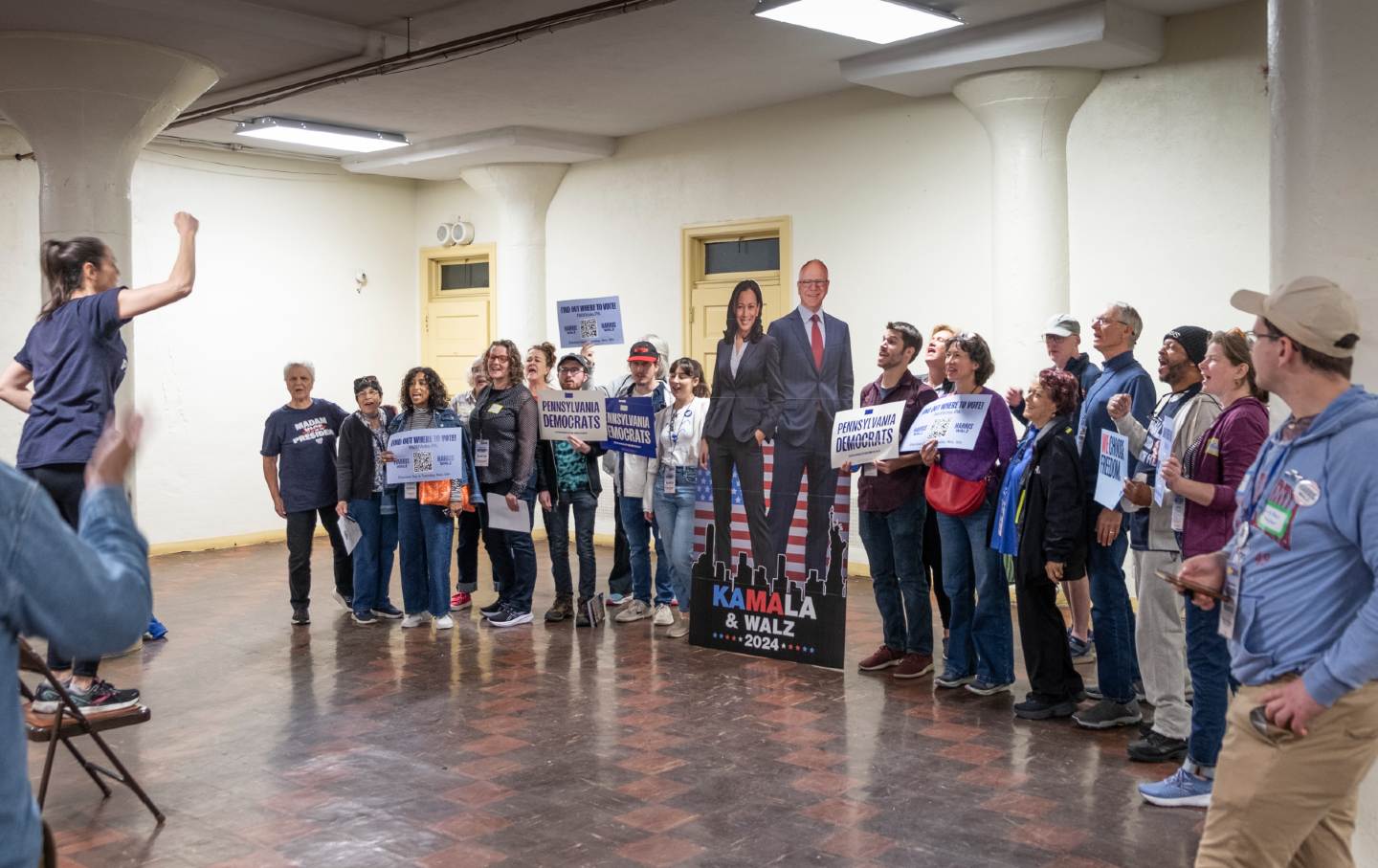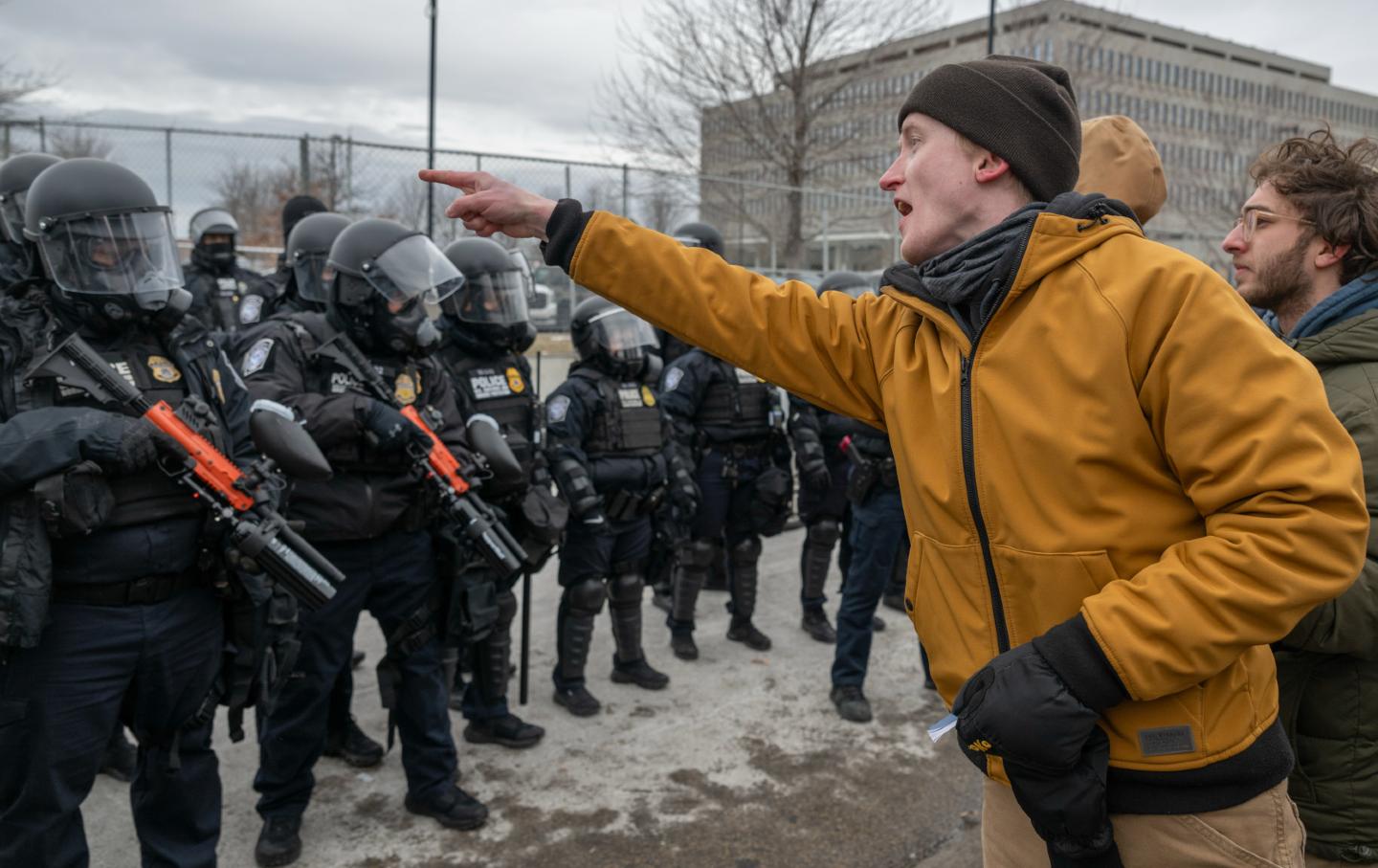Deep Canvassing in Philadelphia: A Love Story
While hoping to change the way people feel about voting—and inspire them to take action on Election Day—the writer also learned something about himself.

“Tell me about someone you love…”
This is the request I have made of dozens of people during the past five weeks while canvassing in Southwest Philadelphia, an area that is over 80 percent Black, where some houses were immaculately cared for, while others were on the verge of collapse. It’s a request I have never made of my own family, my friends, my lovers. Yet here I was, day after day, asking perfect strangers to do exactly that on behalf of Changing the Conversation Together (CTC), a Brooklyn-based nonprofit specializing in what’s known as “deep canvassing.”
I’ve done it while sitting on a porch in the hot sun, peering through an open door at a reluctant voter, and passing the time with someone waiting at a bus stop. A man told me his love story as he sat in an easy chair while, separated by a window screen, I leaned over on the top step of his stoop.
I asked people who took time away from watching the Eagles game, and a group of old friends passing a joint while hanging out on a Saturday afternoon, and a woman resting after returning from the hospital. I asked it through the window of a car while someone was waiting at the drive-through line at a McDonald’s. A young man shared the story of his cousin who had died while serving in the military, while 50 feet away from us a group of people argued in the street.
There was the heavily tatted twentysomething son who loved his mama because she bailed him out of jail late one night. The woman who loved her severely disabled child because he made her smile each day. The man who had been married to his wife for 40 years—who love her because she brought home an air fryer so that he would eat healthy. Story after story, love upon love, from stranger to stranger.
This is the process of deep canvassing: sharing your own story of love, eliciting their stories of love, and in the process making a connection, and then reflecting on which candidate embodies that kind of love. We hope to get people who have not voted in the past to make the effort this year, because casting a ballot is more than a civic duty: It is an act of love.
The idea for this campaign emerged from the Leadership Lab, a Los Angeles–based nonprofit that believes that real and lasting change can only come out of “deep canvassing,” which involves having extended conversations with people who, in this case, have a poor history of voting. A 2016 study published in Science magazine showed that a single, 10-minute conversation could reduce transgender prejudice for at least three months.
Along with hundreds of other CTC volunteers, I hope these conversations will change how people feel about voting, and, more important than that, inspire them to take action and save our democracy from a terrible outcome. We are not charged with changing voters’ minds about who they vote for; our intent is to get those who agree that Donald Trump is the candidate who doesn’t embody feelings of love and empathy to go out on Election Day and vote with their hearts.
At the same time, I’ve come to see how this work has also changed me—and along with it, my understanding of people. The neighborhoods I canvassed were very different from the middle to upper class, predominantly white enclave where I live in Brooklyn. There were many boarded-up houses, crumbling sidewalks, and littered streets. I was instructed to approach people with humility and respect, and through my conversations, I developed a deep love for them, for they entrusted me with their own stories of loving and being loved. I also felt regret that I didn’t know the neighbors in my very own community in the way I came to know the people who live 100 miles away.
As I was walking up Third Avenue in Manhattan today, I also came to understand this: We all have stories of love, including that person who shoved me aside on the subway, or the driver who cut me off at the crosswalk. I now have a superpower: I can get people to tell me a story about love, because I know everyone has one. When I walk down the sidewalk, I envision a little red heart magically appearing above each person’s head as they hurry by.
Later that day I stopped into a small coffee shop, and as the barista made my drink, I leaned over, looked him in the eyes and asked him if he could tell me about someone he loved. He thought for a moment, and said he could think of two, and I coaxed him into choosing one. He told me about his mother, Denise, and how hard she had worked as a single mom to raise him and his brother, and how he loved her strength and care. Then he handed me my drink, we smiled at each other, and went on with our days.
More from The Nation

A Trump Administration Official Says It Won’t Investigate the Killing of Renee Good A Trump Administration Official Says It Won’t Investigate the Killing of Renee Good
Deputy Attorney General Todd Blanche makes clear that the Department of Justice won’t look into the death of Renee Good—but that won’t stop Minnesota from investigating.

Martin Luther King Jr.’s Dream: Love Against Racism Martin Luther King Jr.’s Dream: Love Against Racism
As Dr. King reminded us, “Hate cannot drive out hate; only love can do that.” His words continue to call us toward justice, compassion, and the power of love to confront racism.

It’s Official: The People, Not the Politicians, Are Leading It’s Official: The People, Not the Politicians, Are Leading
In this week’s Elie V. US, our justice correspondent explores the fecklessness of the Democratic Party, MAGA racism, and fighting despite unwinnable odds.

The Week of Colonial Fever Dreams From a Sundowning Fascist The Week of Colonial Fever Dreams From a Sundowning Fascist
The news was a firehose of stories of authoritarian behavior. We can’t let ourselves drown.

Self-Appointed King of Venezuela Self-Appointed King of Venezuela
The United States attacks Venezuela and captures President Maduro. Trump claims that the US will “run” the country for oil interests.



